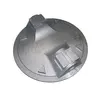Mobile:+86-311-808-126-83
Email:info@ydcastings.com
The Role of Water Pumps in Automotive Engine Performance and Efficiency
The Role of Water Pumps in Automobile Engines
The water pump is a vital component in the cooling system of an automobile engine. It is responsible for circulating coolant throughout the engine to maintain optimal operating temperatures. Understanding the function and importance of the water pump can help car owners appreciate its role in ensuring engine longevity and performance.
Function of the Water Pump
The primary function of the water pump is to move coolant from the radiator to the engine block and cylinder head. This circulation is crucial because the combustion process generates a significant amount of heat. If not properly managed, this heat can lead to engine overheating, which can cause severe damage. The water pump operates continuously when the engine is running, driven by a belt connected to the crankshaft. It utilizes centrifugal force to push the coolant through the engine and back to the radiator where it can dissipate heat.
In modern vehicles, water pumps typically come in two types mechanical and electric. Mechanical water pumps are driven directly by the engine, while electric pumps operate independently, often triggered by the engine's temperature sensors. Electric models improve efficiency by operating only when needed, which can enhance fuel economy and reduce emissions.
Importance of Water Pumps
A functioning water pump is critical for maintaining the engine’s temperature within the optimal range. An engine that runs too hot can suffer from various issues, including warped cylinder heads and damaged gaskets. Conversely, coolant that circulates too slowly can lead to engine parts not receiving sufficient cooling, resulting in increased wear and tear. Therefore, the water pump plays a crucial role in both performance and reliability.
Additionally, the water pump affects the overall efficiency of the vehicle. A malfunctioning pump can lead to overheating, thereby forcing the cooling system to work harder to regulate temperature. This can decrease fuel efficiency and lead to higher emissions, making the vehicle less environmentally friendly. Regular maintenance and checks of the water pump can prevent these issues and contribute to better fuel consumption and lower operating costs.
Signs of a Failing Water Pump
Car owners should be aware of the signs that indicate a failing water pump. Common symptoms include
1. Overheating Engine If the engine temperature gauge shows higher than normal levels, it can be a sign of a malfunctioning water pump.
water pump in automobile engine

3. Unusual Noises A grinding or whining noise from the engine compartment can suggest that the water pump bearings are failing.
4. Steam from the Engine If steam is coming from under the hood, it is essential to stop the vehicle immediately as overheating can lead to serious engine damage.
Maintenance Tips
To ensure the water pump operates efficiently, regular maintenance is necessary. Here are some tips
1. Coolant Replacement Follow the manufacturer’s recommendations for coolant change intervals to prevent the build-up of contaminants that can abuse the water pump.
2. Inspect Belts Check the drive belts for wear and tear, since a worn belt can cause the water pump to fail.
3. Routine Checks Have the cooling system inspected periodically by a qualified mechanic. This can help catch any potential issues with the water pump or other cooling system components.
4. Listen for Noise Pay attention to noises during engine operation. Promptly address any unusual sounds to avoid further problems.
Conclusion
The water pump holds significant importance in the operation of an automobile engine. By ensuring proper function, it helps maintain appropriate operating temperatures, prevents overheating, and contributes to overall vehicle efficiency. Regular maintenance and awareness of potential issues can extend its life and ensure the engine runs smoothly for years to come. For car owners, understanding the role of the water pump is essential for vehicle care and performance.











